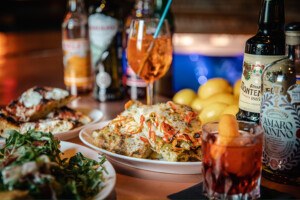Dining Out: We’ll Always Have Bouchée
Newbury Street’s newest brasserie could be on the Left Bank—save the generous portions, fair prices, and amicable staff. We can live with that.
The service at Bouchée, the big, slick, Parisian-style bistro on Newbury Street, is very friendly. That’s the tip-off that, no matter how professional the waitstaff or convincing the décor (and it is convincing), you’re not in Paris. These waiters actually smile.
Of course, plenty about Bouchée is ersatz. What else would you expect from the owners of Papa Razzi, the large, successful chain that offers a strictly middlebrow version of Italian food, served with pizzazz? Bouchée is another take on the formula. But this time, instead of Tuscan trattoria, the inspiration is Parisian brasserie, and its somewhat Disneyfied re-creation is no less loving or seductive, even while you see through it.
The site is auspicious: on Newbury between Dartmouth and Exeter, in the longtime home of Du Barry. The complete refurbishment of the two-story café and patio has traded 1970s faux Paris for glossy 1890s faux Paris, and it looks great. The zinc bar and marble tables on the lower level are reminiscent of the Left Bank’s Café de Flore; the red leather banquettes, brass rails above polished mahogany molding, wood-framed smoked mirrors, and brass-and-globe chandeliers are straight out of a Manet. The nights I dined I saw actual Back Bay residents—a truly rare species amid the out-of-towners who populate Newbury Street. The neighborhood has always been identity challenged, but Bouchée might be doing its modest part to bridge the gap: Friends who live nearby have told me that since it opened in September, Bouchée has become their weeknight standby.
Hiring a homegrown chef who knows how to establish and cater to a local clientele was a smart move. Tim Partridge worked around Boston (briefly for Ken Oringer, and then at East Coast Grill) before opening his intimate, captivating Perdix in Jamaica Plain, down the road from where he lives. When he tried to bring the same feeling to the South End’s restaurant row, along Tremont Street, it never caught on: The semibasement location of the second Perdix (now a new restaurant, Pops; reviewed on page 184) was something of a hexed spot. But Partridge’s self-taught approach to cooking has benefited from the structure of a bistro. Several of his favorite Perdix dishes are right at home on Bouchée’s menu, which is long, straightforward, and, occasionally, a little quirky.
The real strength here, I thought after several dinners, is steak. Maybe the owners picked Bouchée, which means “mouthful,” as a play on boucher, French for “butcher.” At $33, steak au poivre happens to be one of the most expensive entrées on the moderately priced list, and it’s justified: a huge 10-ounce filet mignon, a rich though not fatty-seeming cut that is usually bland on its own. Partridge coats the meat with coarse-cracked peppercorns of various colors, sears it to a dark (not incinerated) crust, and deglazes the pan with a cognac sauce thickened with crème fraîche instead of butter. Everything on the plate is good: that succulent, mile-high meat; the particularly pleasing, no-nonsense whipped Yukon Golds, whose delicate yet substantial texture benefits from their being first riced by hand; the roasted asparagus. It would do any steakhouse proud. The steak frites, at $24, is a generous 14-ounce sirloin (and at least twice the size you’d get in Paris), with herb butter, lemon zest, and parsley. The meat was excellent but the seasoning a bit extraneous, and the fries—medium-cut, not shoestring—suffered from far too much salt.
Oversalting mars many of the main courses, in fact. The sautéed cod ($25) was a hefty portion of fish with bona fide flavor and firm texture—neither one a sure bet with cod—but my guests and I had to will ourselves to dig deep to find them. Served with crisped crêpes full of meaty-tasting mushroom duxelles and nicely chewy creamed corn heavily sprinkled with fresh thyme and parsley, the cod is a Perdix holdover, Partridge told me—and, as I could tell by the disparate elements on the plate, more an example of the chef’s personality than anything you’d find in Paris. The elements work together, though, as they do in another Perdix import, the roasted monkfish ($26): a thick medallion painted with gremolata, that green-herb and lemon sauce (here made without garlic), accompanied by cauliflower in brown butter and not-quite-tender French lentils. In both dishes the different flavors and sauces can read Boston-busy, but the quality and care apparent in the fish itself make each worth eating.
The rest is typical bistro stuff, not all prepared with the same sure touch of that stellar steak, but most of it satisfying. The macaroni and cheese ($8), with big flakes of smoked ham in a gooey, cheesy, fresh-tasting (if, again, too salty) white sauce and coated with crunchy Parmesan bread crumbs, is almost sizable enough to be a main course, and it’s nice to see old-fashioned elbow macaroni make a comeback. The bouillabaisse has a yellow, saffron-scented, soupy—and salty—base, with Pernod and plenty of chopped herbs. The base is a bit more monochromatic than a classic bouillabaisse’s—maybe because there’s not much tomato, and the lobster stock lacks the traditional variety of fish. But the shrimp and scallops are abundant (as they should be, for $34), and the calamari stew, made separately and with thick tomato purée, is exceptional.
The cassoulet had relatively dry flageolet white beans, but was practically all meat, and thus a bargain for $26. Presented in a cast-iron oval dish, it’s packed with local lamb sausage, as well as Partridge’s homemade duck confit and house-cured bacon belly, both with terrific flavor (though the duck had been browned until overly stringy).
You won’t need much persuasion to try dessert, with Bouchée’s lineup of fail-safe standards. The two not to miss are profiteroles ($8) and crème brûlée ($7), which are prone to missteps elsewhere but not here. The crackling-fresh cream puffs, made every day, are filled with local ice cream (from Roslindale) at just the right softness, and the dark chocolate sauce is not too sweet—and terrific. The crème brûlée is an eggy, light custard that seems oddly airy at first but keeps growing on you till there’s nary a curdy morsel left. The tarte Tatin ($8), with undercooked, dull fruit and an underbaked puff pastry crust that requires a band saw to get through, needs to be overhauled, or pulled off the menu.
But overall the prices are good, the portions large, and the vibe lively, too. With just a little tuning up, Bouchée might well go from a welcome addition to an overcrowded neighborhood to the model for a new New England chain.


